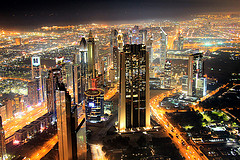Preparing A CV To Land A Job In The Middle East

When you sit down to write a CV for a new position, you are writing an advertisement for yourself. From start to finish, your CV is designed to promote your skills, qualifications, experience, and education that make you the perfect fit for the position in question. As you write your latest CV, you should craft it for the specific position you hope to land, rather than putting together a copy-and-paste replica of previous CVs.
If you are applying for a job in the Middle East, there are specific nuances that you need to be aware of. Just as your CV should be tailored to each specific job, so too should it be tailored to fit different regions and cultures around the world as you consider employment across international boundaries. Hiring managers and organisations in the Middle East have different hiring requirements. If your CV isn’t crafted correctly, you’ll never land an interview.
Beware Discrimination
The most important thing you need to know about applying for a position in the Middle East is that many nations do not have antidiscrimination laws. For example, in Dubai it is not against the law for employers to specify the age, gender, ethnicity, and nationality of the individuals under consideration for employment. If you live in the Western world, you’ve never had to keep these factors in mind when writing a CV.
This means that employers in Dubai and across the Middle East are free to ask you all manner of questions, look for very specific physical traits and characteristics, and judge you as they see fit. If your CV doesn’t compensate for these factors, you are not going to nab an interview.
Include a Photo
If you want your CV for employment in the Middle East to survive an initial peek by hiring managers, you need a photo to go along with your paperwork. You could be considered for an interview simply because you are attractive and presentable. Employers can even make hiring decisions based upon ethnic groups they favour and do not favour. The best way to conform to the specific factors a company is looking for (physically) is to include a photo at the top of your CV.
Include Nationality
It is also possible that employers will make decisions based upon the nationality of applicants. Depending upon the industry the company serves, it may be deemed undesirable to have individuals of a certain nationality employed within the organisation. As a result, companies can (and do) specify nationalities. If you have a mixed background or hold dual citizenship, list those the employer identifies as desirable on your CV. Whatever you do, do not hide these factors when applying for a position in place such as Dubai.

“It is not uncommon for companies based in Dubai and other parts of the Middle East to specify an acceptable age range for applicants…”
Include Date of Birth and Gender
Employers will filter out applicants based upon age and gender. It is not uncommon for companies based in Dubai and other parts of the Middle East to specify an acceptable age range for applicants, or even consider one gender over the other for certain roles. If the position calls for females between the ages of 25 and 35, do not bother applying for those roles if you don’t fit the criteria. You will not be considered. If you meet those factors, it is still important to blatantly state your date of birth and gender to clarify that you fit the mould the employer wants.
Cover Letters
Cover letters are a matter of some debate among recruiters. Some prefer to see one, some do not. If you apply for a job in the Middle East, you need to either write a great cover letter or ignore it completely. A poorly written cover letter lacking any clarity is going to do more harm than good. When you write your cover letter, make it relevant and personal.
Take the time to figure out the name of the individual that will be reading it and address the letter directly to that individual. Keep the letter short and sweet. Highlight the important factors that make you a perfect fit for the position and give that person a compelling reason to read your full CV.
Other Style Guidelines to Consider
Last but not least, there are a few style guidelines to keep in mind when writing a CV for employment in the Middle East. Recruiters want to know as much about you as possible, so do not stick to one page with your CV. If you need two pages to highlight the benefit to the company in hiring you, then use two pages.
Whenever possible, glorify and exaggerate work you’ve performed in the past. There is a big difference between glorifying and lying. For example, if you worked as a data entry specialist, do not simply write “efficiently managed data spreadsheets.” Instead, write that you “created an efficient data-entry method that increased productivity X%.” You aren’t lying about your skills; you are merely calling attention to them in a dramatic manner.
Finally, the overall style of your CV should be strike a recruiter as visibly pleasing, even fancy. When applying for US and UK jobs, recruiters tend like to see clean CVs. For a job in the Middle East, add some style to your CV to give it an appearance that stands out in the crowd. You don’t need to go over the top. Simply consider some thin black lines for borders and consider setting your photo in the header. Little touches go a long way.
Image 1: “Dubai” ©Eugene Kaspersky – https://flic.kr/p/dmXHEv
Image 2: “DUBAI” ©MILACHICH – https://flic.kr/p/nJA44Y
